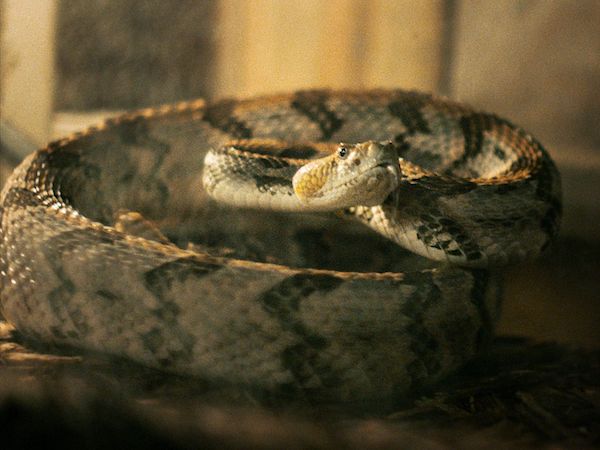Television: “Alabama Snake” — The Wild Wiles of the Serpent
By Sarah Osman
Alabama Snake is crazy, but it also provides the kind of off-kilter insights into humanity one finds in the best of Southern folklore.

A scene from HBO’s Alabama Snake. Photo: HBO
The American South has been fecund ground for many great American writers. Flannery O’Connor, Tennessee Williams, William Faulkner, Harper Lee, Truman Capote, Zora Neale Hurston, all hailed from that bedeviled territory. Is it any wonder? The South’s history is complex and tortured, steeped in sin as it projects a tragicomic heroic mythos. Perhaps this attraction to Gothic extremes — to the point of absurdity — explains why so many tall tales from the South partake of the bizarre. My Southern relatives would often regale me with tales about “the shooting gallery,” a house where the wife shot the husband because he cheated on her; “the cottage,” a plantation where the dead owners still defended it; and “the house with 57 bathrooms” (which is exactly as it sounds). So it should be no surprise that HBO’s latest documentary, Alabama Snake — set in the eponymous state — is utterly insane.
Tiger King will probably go down as the most bizarre documentary of 2020, but Alabama Snake gives it a good run for its money. In 1991, Pentecostal preacher Glenn Summerford allegedly forced his wife to stick her hand in a box full of rattlesnakes. She’s bitten, and nearly dies — but lives to tell the tale. The documentary reassembles what led to this, including interviews with the medics, detectives, and court officials in charge of the case. The creators also offer insights into Summerford’s church, where snake handling is included as part of their rituals.
Glenn Summerford makes for a provocative documentary subject. His past is violent; his stepfather taught him how to fight and Summerford was drawn to fisticuffs well into adulthood, an attraction that eventually led to multiple run-ins with the law. His first wife, Doris, talks about what life was like being married to the guy. Doris confesses she was afraid of him. After a tragedy involving their youngest daughter, Summerford was never the same. (Doris and her life post Glenn would be worth a documentary on its own. She is easily the most delightful of the subjects interviewed; her speech is filled with charming Southern colloquialisms. She first claims that her family doesn’t like her singing, so “she sings to herself … and the Good Lord. He don’t mind.”
Summerford eventually takes a spiritual journey where he discovers Jesus. Born again, he sets up his own church and marries his second wife, Darlene. Much of this volatile period is dramatized through staged reenactments along with actual footage of what is going on in the church. Unsurprisingly, the latter is far more visually interesting than the former. The video sequences presenting the sermons at the services are disturbing as well as fascinating; this is an unruly world of belief that few of us are familiar with. The reenactments are helpful in storytelling, but their lack of sophistication makes this documentary feel, at times, as if it belongs on the Lifetime channel.
We never actually see Summerford. Instead, we hear his testimony through a series of interviews recorded by Dr. Thomas G. Burton, an Appalachian folklorist. Summerford never claims responsibility for what he did — even after he was found guilty in court. We also hear Darlene’s side of things; she claims she was terrified of him from the very beginning of their marriage. It’s never made clear whose perspective is closer to the truth. In this sense, Alabama Snake underlines how questionable subjective testimonies can be. Summerford and Darlene’s traumatized son, Marty, adds his version of the tale — he was clearly disturbed by both of his parents.
Be warned: Alabama Snake is a slow burn. (Or should that be slither.) The narrative starts off with the controversial snakebite, which gets the initial shock out of the way; then it backtracks. Eventually, the film picks up steam, and it is hard to resist. Each segment becomes increasingly preposterous, so that by the time we return to the snakebite it makes a kind of weird sense.
Still, there is a missed opportunity. Burton the interviewer offers some insight into the practice of snake handlers, but there’s little analysis about the theological or psychological attractions (let alone the chances for survival) of a religion that revolves around picking up snakes. Burton goes into some religious parallels, but he never details the history of snake handling. And we never learn exactly how Summerford came to form his church.
Alabama Snake will undoubtedly draw comparisons to Tiger King and other outrageous true crime documentaries. The difference is that HBO’s entry into the genre doesn’t rely on sensationalism. Director Theo Love is less interested in shock than in drawing provocative connections between religion, gender roles, and lives dedicated to falsehood. Yes, Alabama Snake is crazy, but it also serves up the kind of off-kilter insights into humanity one finds in the best of Southern folklore.
Sarah Mina Osman is a writer living in Los Angeles. She has written for Young Hollywood and High Voltage Magazine. She will be featured in the upcoming anthology Fury: Women’s Lived Experiences under the Trump Era.
